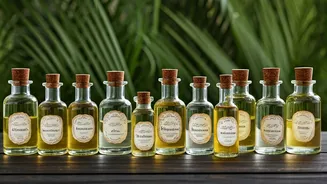Introduction to Hair Oils
Hair oils have been a cornerstone of hair care for generations, prized for their ability to moisturize, strengthen, and promote growth. These natural elixirs
work by penetrating the hair shaft, delivering essential fatty acids, vitamins, and minerals that nourish the scalp and hair follicles. The regular use of hair oils can lead to significant improvements in hair texture, reducing dryness, breakage, and split ends. Moreover, they can stimulate blood circulation in the scalp, which in turn encourages hair growth. This section serves as a preface, explaining the underlying importance and benefits of integrating oils into your regular hair-care practice for remarkable results.
Argan Oil: The Moroccan Marvel
Originating from Morocco, argan oil is often referred to as 'liquid gold' due to its rich composition of antioxidants and fatty acids. It's renowned for its ability to hydrate and soften hair, making it ideal for combating dryness and frizz. This oil helps to protect the hair from environmental damage, such as sun exposure and heat styling. Argan oil is particularly beneficial for those with chemically treated or damaged hair, as it helps to restore the hair's natural luster and manageability. Its lightweight texture allows it to be absorbed quickly, leaving hair feeling smooth and non-greasy. You can use it as a leave-in conditioner or as a pre-shampoo treatment for optimal hydration.
Coconut Oil: The Versatile Favorite
Coconut oil is a staple in many households, celebrated for its versatility and effectiveness in hair care. It's rich in lauric acid, which has a high affinity for hair proteins, allowing it to penetrate the hair shaft deeply and reduce protein loss. This penetration makes coconut oil particularly effective at strengthening hair and reducing breakage. Furthermore, its moisturizing properties help to prevent dryness and maintain the scalp's health. Coconut oil can be used as a pre-shampoo treatment, a conditioner, or even a styling product, offering multiple benefits in a single application. Its natural antifungal and antibacterial properties also contribute to a healthier scalp.
Castor Oil: The Growth Booster
Castor oil is well-known for its potential to stimulate hair growth, thanks to its high concentration of ricinoleic acid. This fatty acid is believed to improve blood circulation in the scalp, encouraging hair follicles to produce thicker, stronger strands. Castor oil is also incredibly moisturizing, helping to combat dryness and dandruff. When applied to the scalp, it can help to reduce inflammation and promote a healthier environment for hair growth. Due to its thick consistency, it's often best mixed with a lighter oil, like coconut or almond oil, for easier application. Regular use of castor oil can lead to noticeable improvements in hair density and overall hair health.
Jojoba Oil: The Scalp Savior
Jojoba oil closely resembles the natural sebum produced by the scalp, making it an excellent choice for balancing oil production. This similarity allows it to easily penetrate the hair shaft, providing deep hydration without leaving a greasy residue. Jojoba oil is also rich in vitamins and minerals, which promote hair strength and shine. It's a non-greasy oil that is easily absorbed, making it suitable for all hair types, especially those prone to oiliness or dandruff. Using jojoba oil helps to keep the scalp clean and the hair shafts strong, contributing to healthier, more manageable hair with a natural, radiant look. It can be used as a pre-shampoo treatment, a leave-in conditioner, or even a styling product.
Almond Oil: The Shine Enhancer
Almond oil is prized for its ability to enhance hair shine and smoothness. It is packed with vitamins E, A, and fatty acids, which nourish the hair and scalp, promoting overall hair health. The light texture of almond oil allows it to be easily absorbed, providing moisture without weighing the hair down. Regular use of almond oil can help reduce frizz and improve manageability, making it easier to style your hair. It also helps to repair damage, making it a great choice for those with color-treated or heat-styled hair. Using almond oil leaves hair looking and feeling soft, shiny, and healthy, promoting a luxurious appearance.
Olive Oil: The Strength Giver
Olive oil, a staple in many diets, is also highly beneficial for hair care. Its rich antioxidant content helps to protect hair from damage caused by free radicals, while its moisturizing properties keep hair hydrated and strong. It is packed with vitamins and minerals, which fortify hair strands, reducing breakage and promoting elasticity. Olive oil can penetrate the hair shaft, helping to improve its texture and reduce split ends. Using olive oil as a pre-shampoo treatment can provide deep conditioning, while regular use can significantly improve the overall health and appearance of your hair, giving it a stronger, more resilient quality. The deep conditioning makes hair healthier.
Rosemary Oil: The Scalp Stimulator
Rosemary oil is frequently used to stimulate hair growth and improve scalp health. Its ability to increase blood circulation to the scalp promotes hair follicle activity and can lead to thicker hair over time. Rosemary oil has also been found to have anti-inflammatory and antioxidant properties, making it beneficial for those with dandruff or scalp irritation. Regular scalp massages with rosemary oil can contribute to a healthier scalp environment, which supports stronger, more resilient hair growth. When applied, rosemary oil helps to reduce hair loss and promotes healthy, lustrous locks by stimulating the scalp.
Tea Tree Oil: The Scalp Healer
Tea tree oil is recognized for its antifungal and antibacterial properties, making it ideal for treating scalp conditions like dandruff and itchiness. It helps to clear clogged hair follicles, allowing for better hair growth and health. Tea tree oil can help soothe an irritated scalp and reduce inflammation, contributing to a healthier environment for hair growth. When diluted and applied to the scalp, tea tree oil can help improve overall hair health. Its cleansing properties also leave the hair feeling refreshed and revitalized, while reducing build-up, leaving a revitalized effect on the hair.
Lavender Oil: The Relaxant
Lavender oil is praised for its calming scent and its ability to promote relaxation, which can indirectly aid in hair health by reducing stress. It is known to have anti-inflammatory and antimicrobial properties that can help soothe the scalp and reduce irritation. Lavender oil can stimulate hair growth and prevent hair loss, making it a valuable addition to any hair care routine. Its pleasant aroma makes it a delightful addition to any hair oil blend, offering relaxation alongside its benefits for hair and scalp health. Regular use of lavender oil promotes a calm scalp and encourages healthy hair growth.












